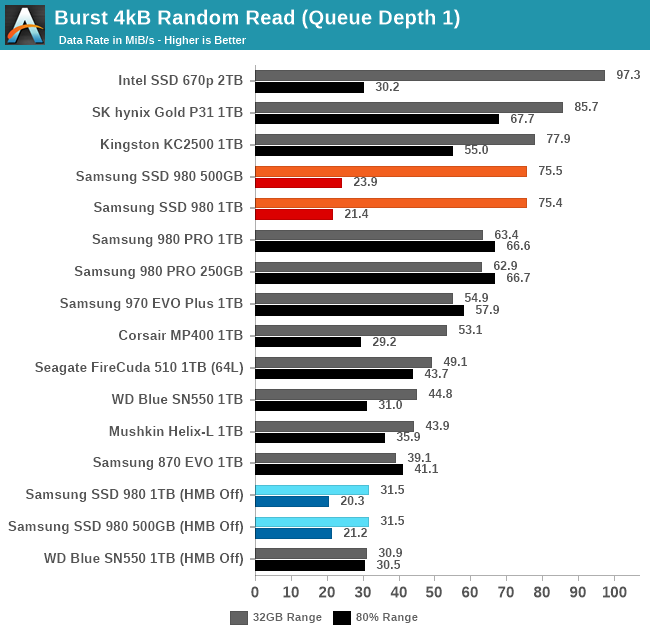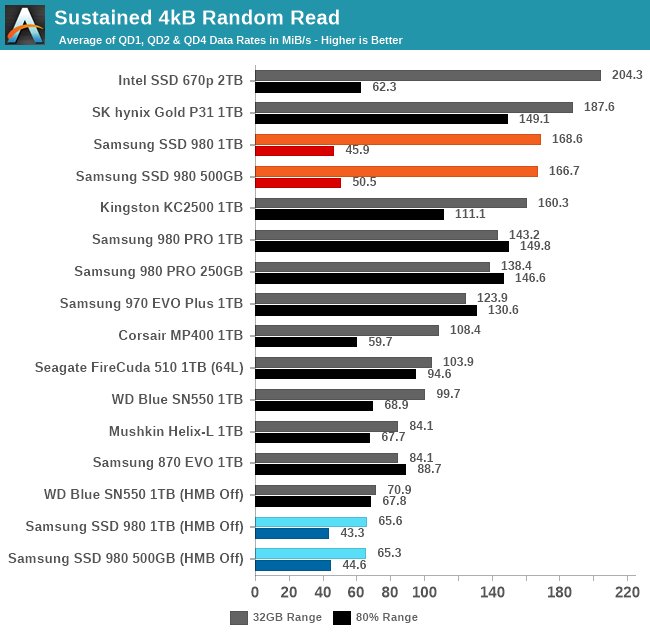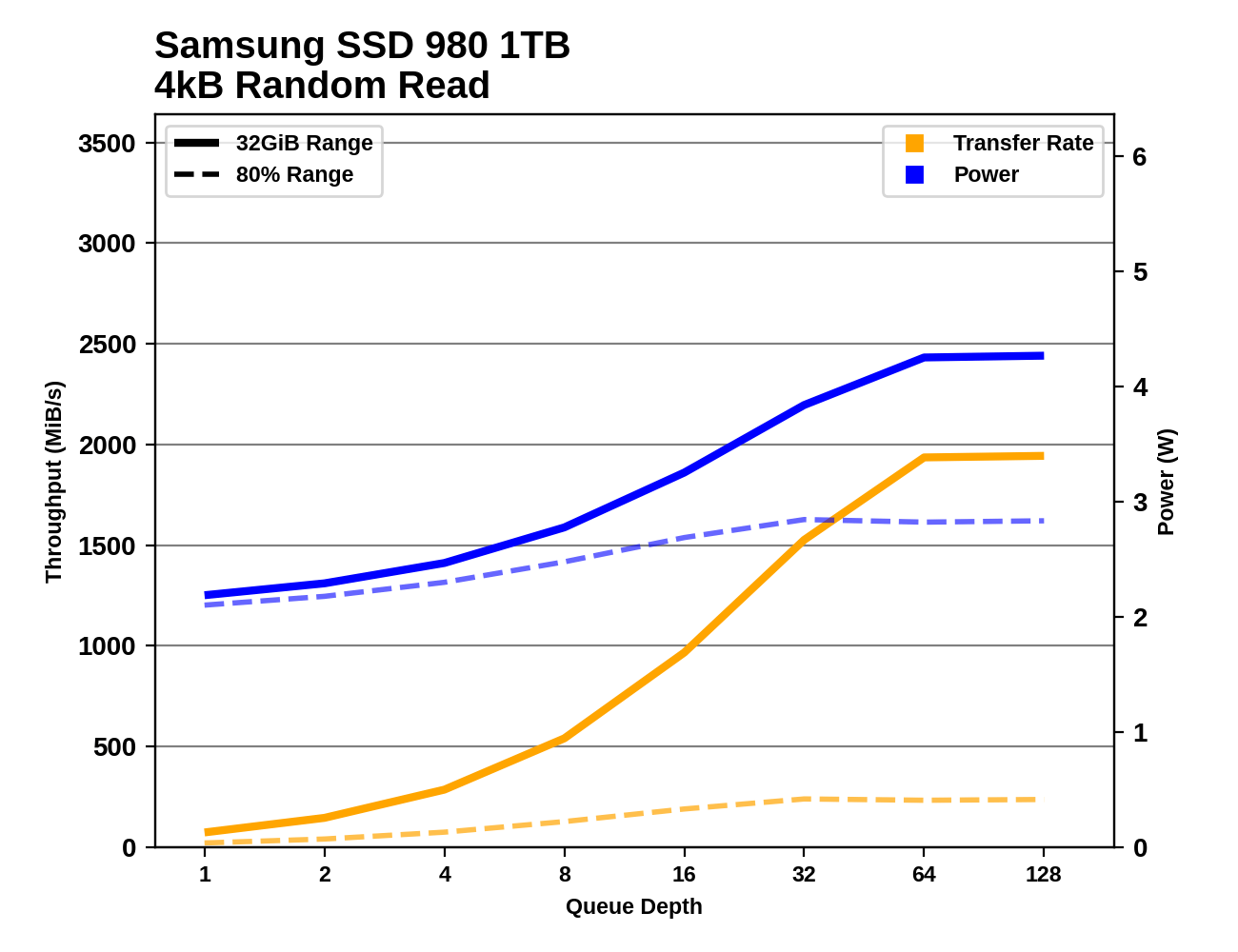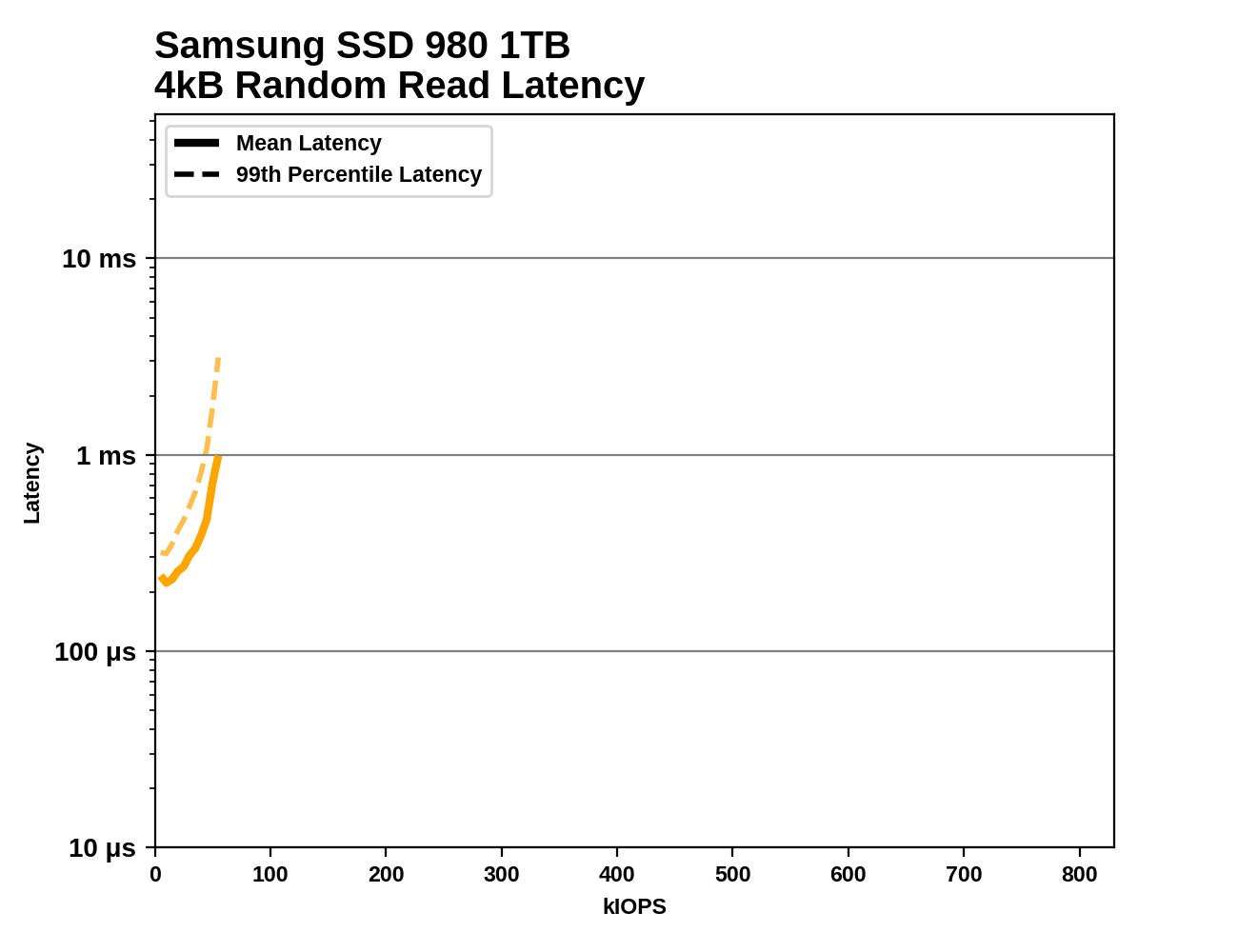The Samsung SSD 980 (500GB & 1TB) Review: Samsung's Entry NVMe
by Billy Tallis on March 9, 2021 10:00 AM ESTBurst IO Performance
Our burst IO tests operate at queue depth 1 and perform several short data transfers interspersed with idle time. The random read and write tests consist of 32 bursts of up to 64MB each. The sequential read and write tests use eight bursts of up to 128MB each. For more details, please see the overview of our 2021 Consumer SSD Benchmark Suite.
 |
|||||||||
| Random Read | Random Write | ||||||||
| Sequential Read | Sequential Write | ||||||||
Given that the Samsung SSD 980 is a DRAMless drive with aggressive SLC caching, it's no surprise to see that most of the burst IO scores show a big difference between testing a small slice of a mostly-empty drive and testing across an 80% full drive. The test runs with the NVMe Host Memory Buffer feature disabled also show how important that is to enabling random IO performance. In the best cases, the SSD 980 even manages to deliver better QD1 random read performance than the 980 PRO. However, when testing against a large data set (or with HMB disabled), the SSD 980's performance only remains competitive for sequential reads. For the other IO patterns, its performance drops far more than typical for entry-level drives.
Sustained IO Performance
Our sustained IO tests exercise a range of queue depths and transfer more data than the burst IO tests, but still have limits to keep the duration somewhat realistic. The primary scores we report are focused on the low queue depths that make up the bulk of consumer storage workloads. For more details, please see the overview of our 2021 Consumer SSD Benchmark Suite.
 |
|||||||||
| Random Read | Throughput | Power | Efficiency | ||||||
| Random Write | Throughput | Power | Efficiency | ||||||
| Sequential Read | Throughput | Power | Efficiency | ||||||
| Sequential Write | Throughput | Power | Efficiency | ||||||
When testing under favorable conditions with a small data set, the SSD 980's performance is at the very least competitive with other entry-level NVMe SSDs and sometimes against mainstream drives as well, but it falls apart too easily. Performance on the sustained IO tests shows similar behavior to the burst IO tests with generally quite large performance drops on the SSD 980 when testing is not constrained to a small data set. Bringing in some moderately higher queue depths has helped the sequential write performance catch up somewhat when testing against an 80% full drive.
 |
|||||||||
| Random Read | |||||||||
| Random Write | |||||||||
| Sequential Read | |||||||||
| Sequential Write | |||||||||
When running the sustained IO tests against a 32GB range of the drives, the Samsung SSD 980 shows good performance scaling with increasing queue depths and can eventually achieve quite high throughput. Random reads take a long time to reach full speed at QD64, while random writes and sequential reads saturate around QD8 and sequential writes saturate at QD2. But testing on a wide range of a mostly-full drive reveals lots of problems: random reads and writes are very slow even at extreme queue depths, and the sequential write test frequently overruns the SLC cache.
Random Read Latency
This test illustrates how drives with higher throughput don't always offer better IO latency and Quality of Service (QoS), and that latency often gets much worse when a drive is pushed to its limits. This test is more intense than real-world consumer workloads and the results can be a bit noisy, but large differences that show up clearly on a log scale plot are meaningful. For more details, please see the overview of our 2021 Consumer SSD Benchmark Suite.
 |
|||||||||
This random read latency test paints a pretty bleak picture for the Samsung SSD 980: every other drive in this bunch has lower latency and higher throughput, and the 500GB 980 actually does slightly better than the 1TB. This test is covering 80% of the drive so HMB is no help here, but that applies to the other DRAMless NVMe drives as well.










54 Comments
View All Comments
Samus - Wednesday, March 10, 2021 - link
Quite ironically to my above statements, I've never seen an PM\SM851 OEM Samsung SSD fail. Not sure what's up with that. They're common OEM drives for HP, Dell and Lenovo circa 2013-2016 and I've seen a lot of those still in service, and selling dirt cheap on eBay. It's no secret the OEM drives have nerfed firmware that lacks some throughput but that has always had me wonder if the M-series controllers are killing themselves at higher clock rates...there is a bit of precident to this as the Intel 730's based on the DC-class drives and controllers were higher clocked and seemed to fail a bit, too.damianrobertjones - Tuesday, March 9, 2021 - link
That's a worry, as nearly EVERY machine with an SSD, in work, is Samsung based. Mostly m.2. due to using intel Nucs.Not one has failed so far.
Kamen Rider Blade - Tuesday, March 9, 2021 - link
Thanks to this article, I discovered the:SK Hynix Gold P31 1TB
A very solid & balanced 1 TB SSD =D
Samus - Thursday, March 11, 2021 - link
I'm running the same SSD in my desktop AND laptop now. Replaced the WD Black in my desktop which kept throttling near 70C in what I'd consider an adequately cooled case. The Hynix P31 rarely even reaches 60F.Great drive. I wish they came in larger capacity :(
fazalmajid - Tuesday, March 9, 2021 - link
So if HMB requires host OS support, how compatible is it with Linux or less common alternative OSes like the BSDs or Solaris/Illumos?Billy Tallis - Tuesday, March 9, 2021 - link
Based on a quick search of online man pages, at least FreeBSD has HMB support. A man page for Illumos dated 2018 makes no mention of HMB, and I don't think they have much reason to implement that feature since enterprise SSDs wouldn't use HMB. But it's also not too complicated to support.sonny73n - Wednesday, March 10, 2021 - link
Performance is entry level but price is not.nvmnghia - Wednesday, March 10, 2021 - link
How is the HBA test designed? Read some < cache size data over and over?nvmnghia - Wednesday, March 10, 2021 - link
I mean HMBoRAirwolf - Wednesday, March 10, 2021 - link
I don't understand why anybody would buy one of these when you can get an SK Hynix Gold P31 for the same price on Amazon. I got an Adata SX8200 Pro 1TB for $100 from best buy the other day, which has DRAM cache. Granted it is the SM2262G with Samsung 64L TLC, but I'll still take that over a DRAM-less drive any day of the week.